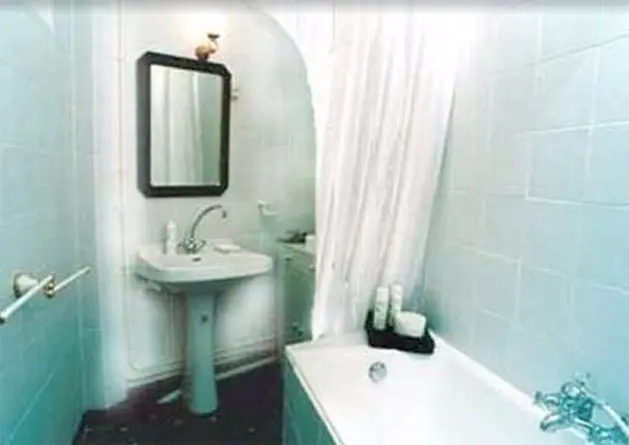The warning signs were there: blurry photos, a long gap between reviews, and a request to wire money. But Elizabeth Long still found the Paris rental impossible to resist. She ended up drawing me into yet another Vrbo problem, this time involving a fake rental and a request for a refund that will be difficult to fulfill.
I keep saying it, but it needs repeating: Sites like Vrbo are not hotels, despite their Book With Confidence Guarantee. These are private homes and apartments, owned by people who have their own motives and whose values may not always align with yours. Or Vrbo’s.
That’s what Long discovered with her problematic Paris rental.
“We signed the rental agreement and paid the agreed upon money according to the terms of the contract, thinking that we would be fully protected,” she remembers. “We were not.”
Long’s story is a necessary reminder of the importance of research when you rent a home online, whether it’s through Vrbo, Airbnb or any other platform. It’s also a painful lesson that wiring money offers virtually no consumer protection, no matter how right you think you are.
How she found a fake rental
Before we get into Long’s Vrbo problem, I should qualify what I mean by a “fake” rental. In this context, you may think of a fake as something that doesn’t exist — a home that either doesn’t belong to the “owner” or that’s a figment of that person’s imagination. In Long’s case, I don’t know if the rental exists. I do know she never got to stay in said rental.
It was Long’s 20th anniversary and she wanted to celebrate with her husband and three teenagers.
“First, we spent five nights in London and had great success with our Airbnb rental,” she recalls. “Our problem arose with our rental in Paris.”
Long explains that she found a place that “looked nice” in Paris through Vrbo.
“It had two large bedrooms and even had air conditioning, which would have been great since there ended up being a heatwave while we were there,” she recalls. “The place had good reviews on Vrbo, although none of the reviews were recent.”
Long says she used Vrbo to contact the owner, who then called her to discuss the rental plans.
“The owner was a French woman, who now lives in New York. She was very friendly and made her place sound delightful. She told us that it was her general policy to provide a separate, written rental agreement outside of Vrbo because she had had issues renting directly through them,” she says.
Paying for this Vrbo rental with a wire transfer
Long signed the rental contract and paid the owner $1,755 — part of it by wire, part by check.
But just a few days before their arrival, she received a text, email, and a phone call from the owner. There was bad news. The apartment had been flooded and would be uninhabitable during their rental period.
“According to the terms of our rental agreement, the owner had the opportunity to provide us with a comparable apartment during our stay,” she says. “She did come up with another place, but that second place was only a one-bedroom, without air conditioning, in a different area of the city, and it was not available for the entire five days.”
The owner also wanted part of her party to stay in a hotel at their own expense.
“And she suggested that our 13-year-old daughter could stay with her friend in a separate hotel room,” she recalls. “As you can imagine, that did not go over well with us. We asked for our money back. The owner agreed via phone to refund us.”
A canceled rental and then silence from the owner
And that’s the last she heard from her.
“She has refused to return my voicemails, texts, or emails over the past ten months,” says
Long began monitoring the listing. When she saw the apartment marked as “unavailable” during her rental period — even though she canceled — she suspected the owner had either double-booked the property or pulled the same stunt on someone else.
“I contacted Vrbo to see if they could help,” she says. “I thought that others might at least want to be warned before renting with her.”
Vrbo said it couldn’t. She wasn’t allowed to post a review of the property because she hadn’t stayed there. And Vrbo couldn’t help her get her money back since she’d booked off the platform. (Related: VRBO scammers strike again.)
“The place is still advertised on Vrbo, with only glowing reviews for the apartment and for the owner,” she says. “Our dream trip has turned into a financial nightmare.”
What happened with this fake rental?
Let’s take a closer look at the rental she booked. The listing on Vrbo raises a few red flags right away, starting with the images. The cover photos aren’t even the apartment; it’s a blurry image of the Arc de Triomphe.
The pictures are problematic, not just in terms of the poor quality, but also of what’s in them. Many of them don’t show the apartment. They’re generic Paris images — the kind you’d find in a tourism brochure.

The interior photos of the property aren’t any better.

And then there are the reviews. The owner has been on the platform since 2008. But for some reason, the 13 reviews only go back to 2012. There are long gaps between some reviews and if you read this site, your “too-good-to-be-true” meter is in the red as you review the almost entirely favorable reviews.
On this Vrbo problem, something doesn’t add up.
Friendly communication with the owner — until…
I asked Long to send me her correspondence between the owner and her.
The paper trail shows a friendly correspondence between the owner, based in New York, and the renter, located near Boston. Then there’s nothing, followed by a frantic, one-way barrage of emails in which Long asks for her money back. It appears the owner handled all the cancellation-related communications by phone.
The final demand letter fills in a few details, but probably didn’t help the situation:
Following up on the numerous phone calls, texts, and emails that have gone without response over the last three to four weeks, this letter is intended to serve as written notice that you remain in violation of our lease agreement dated January 12, 2018, for the apartment at 4 rue du Chateau, Paris.
As you are well aware, on June 18, 2018, nine days before our scheduled rental date, you texted and emailed me to call immediately. When I promptly called you back following your text and email, you told me that the apartment had flooded and was not habitable.
You were not able to find us another comparable apartment that was available for the duration of our booking period (June 27 to July 2, 2018), and as a result, I asked both by telephone and via written notice the next day (June 19) that you provide a full refund of the money we had paid per the cancellation policy in our lease agreement.
What does that lease agreement say?
And then Long went on the point out her interpretation of the lease agreement as a “licensed attorney in Massachusetts.”
In case of cancellation by the lessor, another apartment will be provided or rental money will be refunded to the lessee.
We have since texted, called, and emailed you numerous times over the past 3-4 weeks, with no response whatsoever.
If we do not receive a check in the amount of $1,755 (corresponding to our first payment of $877 made by wire transfer on 1/17/18, and our second payment of $878 made by personal check on 5/1/18) within 10 days of your receipt of this letter, we will proceed with legal action against you.
Please note that this is not an empty threat as I am a licensed attorney in Massachusetts and have colleagues in New York who will be assisting me with my case against you. In addition to bringing legal action to recoup the money owed to us, we will also be pursuing the following actions if we do not promptly receive the money owed to us:
- Filing formal complaints with Homeaway.com and VRBO.com;
- Submitting reviews on both Homeaway.com and VRBO.com to inform potential renters of our experience with you;
- Filing complaints with the NY Attorney General and NYC Department of Consumer Affairs; and
- Filing a complaint with the FBI Internet Crime Complaint Center (IC3).
This has been a very unacceptable experience, and we are asking that you promptly make this right. I certainly did not expect you to breach the contract, after you were so friendly and helpful to us in our numerous phone conversations and emails back in January. We saved up for this dream vacation, and you have managed to ruin it for us. Please send us a refund check to rectify the situation immediately.
On a problem-solving mission, threats are rarely productive
It’s unclear if Long followed through on any of these threats. But as I note in my story on how to resolve a consumer complaint, threats rarely are productive.
If you’ve ever wanted to end a complaint letter – or phone call, for that matter – with the words “I’LL NEVER FLY YOUR AIRLINE AGAIN!” or “I’LL SEE YOU IN COURT!,” then let me offer a little advice. Don’t. Threats won’t just guarantee your failure. You could also end up on a company’s blacklist (oh yes, they have them), or if your threat is serious enough — say, you threaten the president of the company with bodily harm – you could find yourself on the wrong side of the law.
OK, enough with quoting myself. You get the idea! (A couples online review about the property not meeting their expectations for a $3,500 five-night stay resulted in a $500 fine.)
What are your rights when you have a Vrbo problem?
Your rights under Vrbo’s booking guarantee are clearly outlined on the site:
- Reservations must be paid for through the HomeAway checkout.
- If the property is significantly not as described, unsafe, or you are denied access, you must contact Customer Support within the first twelve (12) hours of the event.
- If your reservation has been canceled less than 30 days from your stay and you are unable to locate a similar property available during the same period.
- You must contact Customer Support within 30 days of the incident (or by phone within 12 hours of entering the property on the first day of the stay in the event that it is materially not as described or uninhabitable)
I’ve highlighted two of the terms because Long’s Vrbo problem is, well, problematic. She wired money and then sent a check, and it’s unclear if she involved Vrbo before the 30 days expired.
Pay for your rental away from the Vrbo platform, the company can’t help
So when I asked Vrbo about her case, the following response didn’t surprise me:
We looked into this case and found that Ms. Long booked and paid for her stay off Vrbo’s platform, so she is not covered under the Book with Confidence Guarantee. Thus, any refund requests or disputes should be between Ms. Long and the property owner.
I think we could all see that one coming. But I asked Vrbo about the fake rental — would the owner be able to continue renting her apartment and then asking guests to pay by wire or check?
Vrbo strongly suggests that its owners create a separate rental agreement, to “define the legal relationship between you and your guests.” Vrbo doesn’t forbid its owners from requesting payment by wire, but it certainly frowns on the practice. In a post about how to spot a vacation rental scam inquiry, written for owners, it notes that an offer to pay by wire is fishy.
Vrbo’s red flags for owners:
- Demonstrates a poor grasp of spelling, grammar, capitalization, and punctuation
- Uses a free online e-mail service
- Gives you far more information than the typical traveler
- Is a religious figure, sea captain, doctor, or officer in the armed forces
- Wants to arrange a surprise trip for someone else
- Provides excuses about not being able to use a credit card (i.e., they don’t feel comfortable because credit cards aren’t “safe” or available where they live)
- Wants to pay by certified check, cashier’s check, or unsecured wire transfer
- Offers to pay more than your stated rate
- Unsolicited payment information in the initial inquiry
- No inquiry comments or traveler phone number provided
- Arrival within 24 hours for a short stay (i.e., They stay/leave before the owner becomes aware that funds are reversed because of the use of stolen credit card information.)
- Refers to your home improperly in the body of the inquiry (i.e., asks about your lovely apartment when you own a cabin)
- Submits inquiry for specific dates but will often tell homeowner that dates are flexible
- Gives you an uneasy feeling that something isn’t quite right.
You know, if Vrbo applied some of these criteria to its owners, would I even be writing this story?
Vrbo’s official response
By the way, I list Vrbo’s executive contacts on this site. If you ever need to appeal to someone higher up, you can.
I asked my Vrbo contact if the owner — who had cleverly lured Long off the platform in a phone conversation — would be able to continue listing her charming apartment on Vrbo.
“We looked into the partner’s actions and record of renting on the platform and found that they’ve been in strong standing throughout,” my contact said. “Our policy in this situation is to warn the partner that if their behavior persists, punitive action will be taken, which could include stripping them of their Premier Partner status. In the majority of cases, this warning suffices to correct their actions.”
So that’s it. The apartment owner gets to keep Long’s $1,755. Presumably, if she does this again, Vrbo will take “punitive action.” But we’ll never know.
The takeaway? Never, never, ever pay for a vacation rental by wire transfer or check. You could end up with a fake rental and $1,755 poorer.




